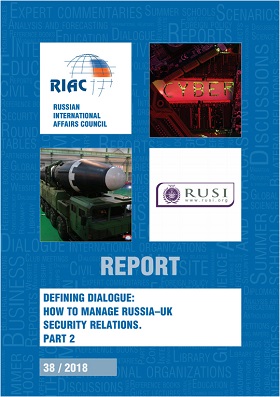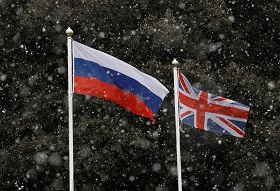It would seem that that those optimists who sincerely believed that the accumulated problems in Russia-UK relations would simply resolve themselves, and in short order to boot, have all but disappeared. Addressing “sore spots” directly is also impossible, since both parties are too sensitive regarding potential concessions. Addressing those issues would be possible only when the current points of contention — which are simultaneously points of contact between both parties — have been investigated.
Are there any issues where Russia and the United Kingdom could come to an agreement? Taking stock, there are at least three such areas in security: military collaboration, nuclear arms control and cybersecurity.
The trend towards positive thinking appears to have bypassed international relations; the winter of 2018 has been a long one, with the chill extending beyond the weather to foreign policy. The notorious Skripal “case” has only served to exacerbate heightened tensions between Russia and the West.
Against the backdrop of the ongoing confrontation between Russia and the United States, Moscow–London relations appeared to have taken a backseat. The United Kingdom has vigorously supported the US line, even if the two countries did not always agree on certain small issues. Many saw the US–UK tandem as a single entity and supported a unified approach to both. Recent events have forced Moscow to revise, if not fundamentally reassess, its vision of the US–UK tandem, and treat the United Kingdom as a belligerent counterpart in its own right.
Despite increasing difficulties in political relations between Russia and the United Kingdom, business and Track II diplomacy contacts continue. Over 100 large Russian companies bolster their presence in the UK market every year, while over 600 British companies work in Russia. Although the general political chill resulted in the expulsion of diplomats and the closure of certain non-profit organisations, business has not suffered any major losses thus far. As for Track II diplomacy, British and Russian think tanks continue to cooperate on multiple projects intended to stimulate dialogue between the two countries.
It would seem that that those optimists who sincerely believed that the accumulated problems would simply resolve themselves, and in short order to boot, have all but disappeared. Addressing “sore spots” directly is also impossible, since both parties are too sensitive regarding potential concessions. Addressing those issues would be possible only when the current points of contention — which are simultaneously points of contact between both parties - have been investigated.
The report prepared jointly by the Russian International Affairs Council (RIAC) and the Royal United Services Institute (RUSI) analyses the current state and opportunities for security cooperation between the two countries. Explaining the reasons for specific events is a fairly helpful enterprise, but it is not particularly conducive to solving the accumulated problems.
Are there any issues where Russia and the United Kingdom could come to an agreement? Taking stock, there are at least three such areas in security: military collaboration, nuclear arms control and cybersecurity. The most interesting is saved, as always, for last.
When we talk about military collaboration, we are far from discussing joint exercises or even uniform sartorialism. The key proposal is mutual honesty. To provide accurate information about large-scale military exercises anticipating possible misunderstandings and subsequent exchanges of claims and counterclaims after new incidents or fake news erupting in the media. In addition, more and more often, international humanitarian situations are arising where active collaboration between two states could help promote a solution.
Resolving the issue of nuclear arms control looks like a recipe for reconciliation. Yet the proof of the pudding is in the eating; ideals have yet to become practices. Nonetheless, this area is still an excellent platform for dialogue and collaboration between states, and not only in the traditional US-Russian format. Experts from Russia and the United Kingdom propose expanding the dialogue to five parties (including the United Kingdom, France and China) and holding multilateral meetings on the issue. Emerging new areas for military conflict once again emphasize the need to discuss problems and search for solutions.
Finally, proper attention should be paid to collaboration in cybersecurity (referred to in Russia as “information security”). Although this has become a rather negative buzzword over the past two years in UK-Russian relations, it is precisely in the cyber sphere that the most energetic behind-the-scenes work is being done. Russian companies are actively involved in cyber incident investigations in the United Kingdom, while the United Kingdom for its parts has taken a more reasonable stance in the Kaspersky Lab case, agreeing to an independent assessment of the safety of the Lab’s products after the much-publicized scandal. The behaviour of the British authorities in this instance creates a positive precedent and indicates that all is not lost between the two countries in this area. Opening a “hotline” for responding to cyber incidents would be a logical next step in the joint work in this sphere, which is particularly relevant before the 2018 FIFA World Cup Russia.






